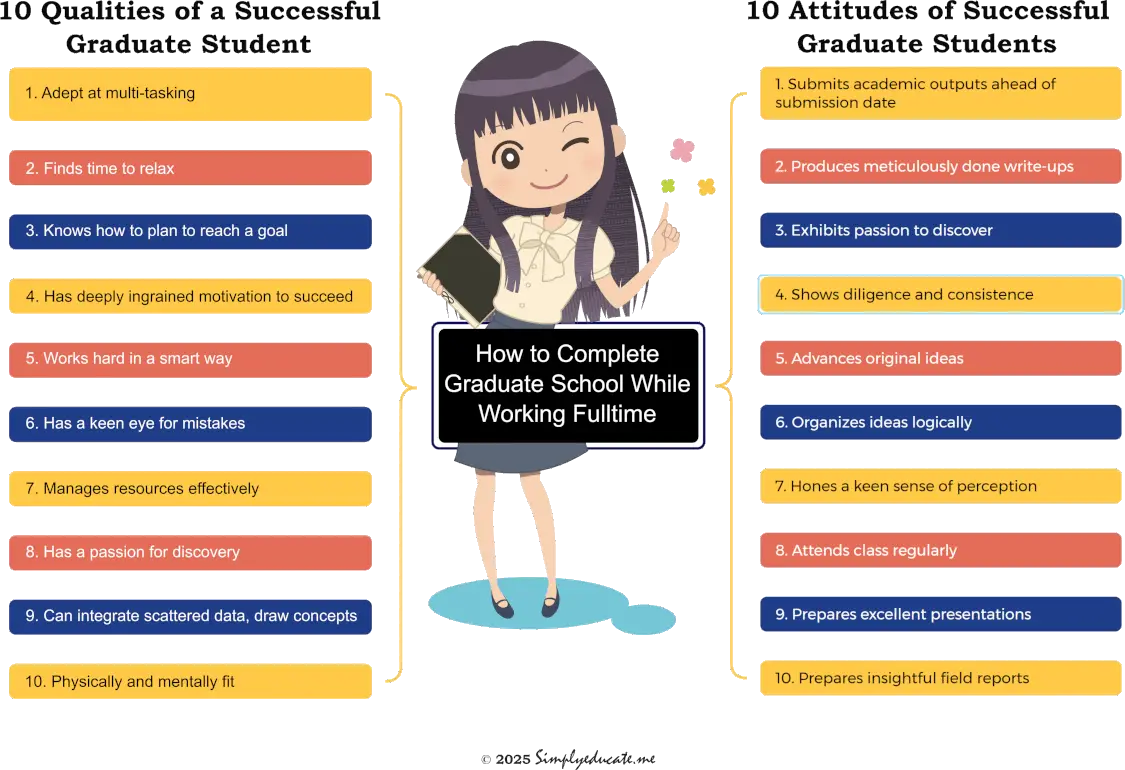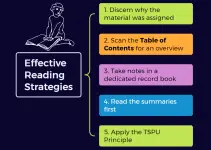
How can you succeed in your quest towards obtaining a higher degree? Are there desirable traits that you should cultivate to reach your goal? I write these tips on how to complete graduate school while working full time based on personal experience and student feedback.
See if you have the following 10 qualities of a successful graduate student. If you are already enrolled, see what I look for in the outputs of my students to guide you along your way.
Table of Contents
Every time new graduate students enroll in the subjects I teach, I always give tips for them to ponder and adopt while pursuing a higher degree. I do this primarily to encourage them and ensure that they finish what they have aimed to achieve, that is, to finish an advanced degree.
What are the qualities or characteristics that a graduate student must have in order to succeed? I draw upon my experience and my observations of students who have made it through the graduate school.
How to Complete Graduate School While Working
To complete graduate school while working, you need to possess the qualities of a successful graduate student. I gathered the following list of these qualities based on my own experience and observations of my graduate students, who successfully completed their degrees within the allowed timeframe. This list applies to both master’s degree and doctoral degree students.
That’s the first part.
The second part pertains to the quality of output they provide while doing their course work. I read every word they compose thoroughly when I examine their outputs like essays, short-term research outputs, and the way they participate during class discussions.
Here’s the outcome of my musings.
10 Qualities of a Successful Graduate Student
You may already have some of the traits below but consider other characteristics that you might have missed.
1. Adept at multi-tasking
A successful graduate student should be able to balance multiple responsibilities and adapt to changing circumstances, effortlessly shifting between tasks.
Graduate schoolwork is demanding so you must develop this skill to succeed. While waiting for the computer to boot, arrange things in your table.
2. Finds time to relax
Despite the grueling work involved in graduate school work, a successful graduate student should find time to relax. The old saying “All work and no play makes Johnny a dull boy” holds true. Taking rest replenishes your energies to do more.
I find my 30-minute trip to dreamland invigorating. A quick nap relaxes me and sharpens my wits once again to write much more efficiently.
Give yourself a rewarding rest and relaxation each time you accomplish something. Even a visit to a beach and seeing the horizon can give you a good break from a hectic day.

3. Knows how to plan to reach a goal
Planning saves time. Breaking tasks into manageable bits keeps the momentum going. Work on the most urgent and important ones. Imagine your goal and picture yourself reaching that goal. Your body follows what your mind sets you to do.
4. Has a deeply ingrained motivation to succeed
Think of the benefits you will gain once you finish your advanced degree. This can keep you motivated to go on despite the hardships along the way.
Always be positive, stay on course and finish what you have started. The end result of pain is gain.
5. Works hard in a smart way
Don’t be exasperated by lots of reading materials. Enjoy your readings and extract important theories or concepts from them. This activity becomes much more meaningful if you ask yourself some questions before reading.
Questions like “What do I want out of this reading material?” or “What significant piece of information do I need to derive from this book?” can spare you from wandering about the text. Read with a purpose in mind.
Related Post: 5 Graduate School Tips on How to Read Faster
6. Has a keen eye for mistakes
A good graduate student has a keen eye to notice mistakes. They do not take things for granted. They are meticulous to see even a wrong punctuation or illogical statements in their write-ups. They write the References section completely, with all the commas, periods, and semi-colons in their proper places.
7. Manages resources effectively
A successful graduate student manages important resources like time, money, and effort efficiently. They keep appointments, arrange files for easy retrieval, and work on assignments quickly. They pass class requirements on time.
8. Has a passion for discovery
The end result of a master’s degree or a doctoral degree is the capacity to do research. Research is performed to discover new things or new relationships between variables.
If you have that passion to discover something new, then that will keep you going in your chosen field of specialization. Discovering something new is satisfying.
9. Can integrate scattered data and draw up concepts
Integrating scattered data or information takes some skill. Once you develop this skill, it will be easy for you to develop concepts that will guide you through research work. Concept building requires higher thinking skills like analyzing, synthesizing and evaluating different works on a given phenomenon. See Bloom’s Taxonomy. It’s still relevant in the age of AI.
10. Physically and mentally fit
Last but not the least, graduate students should be physically and mentally fit so as to take on the stress associated with graduate school work. Walking or running for a total of 150 minutes each week can give you the energy and conditioning to take on long hours of reading and writing.
10 Key Indicators of Scholarly Performance in Course Work
1. Academic Outputs Ahead of Submission Date or On-Time
I place a premium on early or on-time submissions of required outputs. Students who submit on time demonstrate respect for the time frame allocated to them. This requirement makes sense because late submissions can indicate a lack of time management skills or a lack of commitment to the course, which I consider to be a sign of disrespect.

2. Meticulous in their write-ups
Graduate students who successfully complete their degree often demonstrate a strong ability to articulate and defend their arguments. They are able to provide supporting evidence and data to strengthen their claims. This skill is essential in academic and professional settings, where clear and persuasive communication is crucial.
3. Passionate in their work
I can readily see who among the students are merely complying and not really into their graduate work. Some are just mindful of their promotions in their respective agencies once they finish their degrees.
Signs of poor outputs include poor handwriting because once in a while I let them write something to synthesize what they’ve learned during the discussion. That may be a minor thing but it means something to me because lack of care on your output means you don’t care who reads your work.
4. Diligent and Consistent
Graduate students who complete their degree are diligent and consistent in their outputs. They consistently meet deadlines and complete all assigned work to a high standard. By working efficiently and carefully, they are able to produce high-quality work that showcases their skills and knowledge.
5. Original ideas arise
I can sense that some of my graduate school students use automated systems, as I can detect it given my extensive experience with online activities as a blogger. It’s easy to spot what they can write and what they cannot, and I have a way of determining this.
At the beginning of the semester, I ask them to write an essay to get a sense of their writing abilities. Later outputs reveal whether they indeed wrote the work themselves, asked someone with writing expertise, or used AI writing software. If the later work is perfect, but they struggled with writing in the initial essay, I wouldn’t bother reading the rest of the AI-composed work, as it’s not their own abilities I’m evaluating, but someone else’s.
6. Organized paper work
Successful graduate students consistently present their work in a logical and well-organized manner. Early in my class, I provide them with guidance on how to write, including deductive and inductive writing approaches. When they follow these tips, their work is easier to understand and I can see that they have adopted a clear and structured approach to presenting their ideas.
I reward high-quality work with a full score, while mediocre submissions receive a score that falls just above average. For example, a score of 4 out of 10 would indicate a poor effort, which is disappointing in a graduate-level student.
As they are pursuing an advanced degree, I expect to see more than average effort. It’s unacceptable for someone to receive a diploma with honors when their output does not warrant it. I expect to see evidence of a genuine effort to excel in their work.
Related Post: How to write a thesis statement
7. Keenness in even the minute things
Missing a comma or writing a very long paragraph in one sentence can be a sign that one is not having a clear thought process. I explain to them the idea of writing following the TSPU principle. If they do not follow this principle and I have a difficult time understanding what they mean, then I can only give a rating of 3 out of 5, which is a score that acknowledges their effort and the ink they’ve used [just an expression], but does not reward the quality of their writing.
8. Low quality outputs due to poor attendance
I dislike students coming to my class too late, as it prevents them from listening to my time-sensitive lectures. I start each class with an introduction that sets the stage for the main content, and I expect my students to be on time. I understand that they are working full-time, but I need to see their effort to come on time, no matter what it takes.
Being late in school is negatively correlated with academic performance (Moldero et al., 2024), so I expect my students to make a commitment to being on time.
While I can accept lateness if it doesn’t negatively impact the quality of their work, I’ve noticed that students who are consistently late, sometimes absent, tend to submit low-quality outputs as well, which suggests a lack of extra effort.
9. Well-prepared presentations
Students who tend to complete graduate school work always prepare amazing presentations. I once had an MS student whose presentations would leave you stunned each time. He was meticulous and effective in relaying his message with powerful and insightful slides, which clearly demonstrated the care, time, and effort he had devoted to crafting each one.
As for his academic achievements, he consistently excelled in conference presentations, winning numerous awards for his work. His master’s thesis was of exceptional quality, even qualifying him to pursue a doctoral degree.
10. Insightful field reports
Since my area of work requires extensive field work in environmental science, the students help me organize field visits or conduct case studies. Some of them get involved in my research projects on coastal areas.
While everyone seems to enjoy the trips, there are those who stand out by writing with enthusiasm and insight after their field experience. Specifically, the students who produce well-researched papers with evidence-based arguments are those who consistently complete their graduate school work on time or within the allocated time frame.
Evidence of critical thinking is a must.
There, you have it. It’s time you apply whatever you learned today. Just go go go. When you hit a wall, break that wall. There are a lot of opportunities waiting for you once you surmount the challenges.
References
Moldero, R. M. S., Acosta, R. A., Zuniega, L. C., Dulnuan, H. H. B., Lobo, B. B., Ramel, J. D. V., … & Bautista, R. G. (2024). Factors affecting Tardiness and absences: a basis for intervention. American Journal of Educational Research, 12(6), 187-194.
© 2014 September 17 P. A. Regoniel | Updated 2025 August 15



